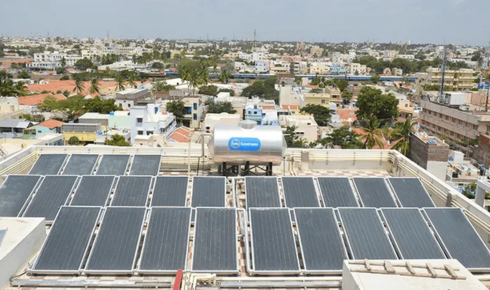Solar Water Heating System, Solar Industrial

The increasing demand for renewable energy solutions has led to the growth of innovative technologies that harness the sun’s power for everyday use. One such advancement is the solar water heating system, which provides an efficient, eco-friendly, and cost-effective way to heat water for residential, commercial, and industrial needs. By using solar energy instead of conventional electricity or fossil fuels, these systems reduce energy bills while also lowering carbon emissions.
How a Solar Water Heating System Works
A solar water heating system uses solar collectors, usually installed on rooftops, to capture sunlight and convert it into heat. This heat is then transferred to water stored in insulated tanks, ensuring a continuous supply of hot water throughout the day. The system can work effectively even on cloudy days, thanks to advanced heat retention technologies.
There are two main types of solar water heating systems:
- Active systems – These use pumps and controllers to circulate water or heat-transfer fluids between collectors and storage tanks.
- Passive systems – These rely on natural convection and gravity, making them simpler, cost-effective, and requiring minimal maintenance.
Both types are designed to suit different applications, ranging from households to large-scale industrial operations.
Advantages of Solar Water Heating
The benefits of adopting a solar water heating system are numerous. Some of the key advantages include:
- Energy savings: Heating water consumes a significant portion of electricity in homes and industries. Switching to solar can reduce dependency on costly conventional power.
- Eco-friendly solution: It reduces greenhouse gas emissions, helping to combat climate change.
- Cost efficiency: Once installed, the system requires minimal operating costs, ensuring long-term savings.
- Durability: High-quality solar heating systems can last for 20 years or more with proper maintenance.
Role of Solar Heating in Industrial Applications
The adoption of Solar industrial heating solutions has been growing rapidly in recent years. Industries such as textiles, food processing, pharmaceuticals, dairy, and chemicals require large amounts of hot water and steam for their daily operations. Traditionally, these industries rely on electricity, diesel, or coal-based boilers, which not only increase operational costs but also contribute heavily to pollution.
Solar water heating systems provide a sustainable alternative. By harnessing solar energy, industries can generate hot water and steam at a fraction of the cost, reducing dependency on fossil fuels. In addition, switching to solar heating enhances corporate sustainability profiles and helps organizations meet environmental compliance requirements.
Government Support and Policies
In India, the government has been actively promoting solar technologies through subsidies, tax benefits, and financial incentives. The Ministry of New and Renewable Energy (MNRE) offers capital subsidies for installing solar water heating systems in residential, commercial, and industrial sectors. These initiatives aim to make renewable energy affordable and accessible for all.
Many states also have policies to encourage industries to adopt solar solutions, including mandatory renewable energy usage in certain sectors. With rising energy costs, these incentives make solar adoption not only practical but also profitable in the long run.
Choosing the Right System
When selecting a solar water heating system, it is important to consider the size of the facility, water consumption patterns, climate conditions, and budget. Reputable solar companies provide customized solutions, ensuring maximum efficiency and durability. Regular maintenance, such as cleaning solar collectors and checking storage tanks, further enhances performance.
The Future of Solar Heating
The future of solar heating systems looks promising as both residential and industrial demand continues to rise. With growing awareness about climate change and the need for sustainable solutions, more households and businesses are expected to adopt solar water heating technology. Innovations such as hybrid solar heating systems and smart monitoring will further improve efficiency and ease of use.
Conclusion
Switching to solar water heating is a step toward sustainability, energy independence, and cost savings. For households, it ensures an uninterrupted supply of hot water while reducing electricity bills. For industries, it offers a reliable and eco-friendly solution to meet large-scale heating needs. As solar technology becomes more advanced and affordable, adopting solar heating systems will play a vital role in shaping a greener and more sustainable future.



